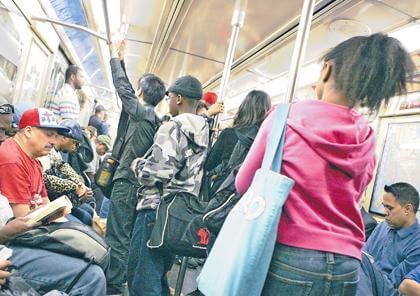By Philip Newman
Bus and subway average fares could rise to at least $2.50, average Long Island Rail Road one−way fares could jump to $7.31 and the $81 monthly unlimited ride MetroCard could go to $104, according to a financial review by the city Independent Budget Office.
“Transit fares will go through the roof and service through the floor unless Gov. Paterson and state legislative leaders come to the rescue of transit riders,” said Gene Russianoff, attorney for the transit advocacy agency Straphangers Campaign, which released the IBO financial review Dec. 9.
The IBO relied on Metropolitan Transportation Authority projections in preparing the analysis.
The review said the MTA’s “doomsday plan” calls for a 23 percent greater yield from revenues coming from the farebox. The IBO calculated that this would, in turn, require an actual 28 percent increase in fares, including the base fare and all fare discounts. The higher percentage increase calculated by the IBO takes account of a likely loss of ridership due to the fare increases.
The MTA issued the following in response to the IBO analysis of its plan to deal with its financial straits: “Development of fare policy is complicated and we have only just begun that process. The sizes of the fare and toll increases required under the current budget proposal are greater than what we would want to implement. We hope that elected officials throughout the state will support the Ravitch Commission’s recommendations giving financial stability to the MTA, so that we can avoid implementing some of the difficult measures in the budget proposal.”
Unlimited ride MetroCards account for half of all trips, according to the MTA, with 32 percent of trips taken on 20−day MetroCards. Seven−day MetroCards account for 15.5 percent of all trips.
The MTA has also proposed $177 million in service cuts, including eliminating two subway lines, increasing non−rush hour waits, running less frequent trains at night and reducing service or eliminating dozens of bus routes.
The IBO said that if these reductions were rescinded, the transit fare would have to rise 32 percent in 2009. That would result in 30−day unlimited ride MetroCards costing $107 and seven−day MetroCards costing $33.
The IBO said an equivalent 28 percent increase in commuter rail fares would push the average one−way fare paid to $7.31 on the LIRR and to $7.91 on Metro−North Rail Road. Average commuter fares would go up 32 percent if the service cuts were rescinded to $7.53 on the LIRR and $8.16 on Metro−North.
Why the worse scenario than those of the MTA?
“It may be the MTA’s figures were more cautious or because of other factors,” Russianoff said. “I don’t think the MTA was trying to sugar−coat the situation.”
The IBO was established by a City Charter revision commission in 1989. Its mission is to provide independent, non−partisan financial information to public officials and civic groups.
The transit review was done at the request of the Straphangers Campaign.

































